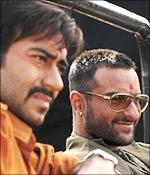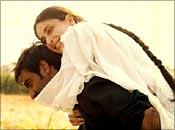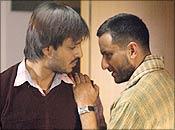|
|
| Help | |
| You are here: Rediff Home » India » Movies » Reviews |
|
 | ||||
| Related Articles | ||||
|
•
Kareena, minus makeup
| ||||
| |||||||||||||||||||||||
|
| |||||||||||||||||||||||
When you decide to adapt anything by William Shakespeare, what you need is a lot of courage.
You are, to begin with, working with material over 400 years old -- tales that have been told and retold in all known corners of the globe. To take this familiar work, then, and give it new life, calls for that kind of courage.
Vishal Bhardwaj is certifiably a courageous man.
Apart from taking control as the director of Omkara [Images] -- his much-publicised and flaunted adaptation of Othello -- Bhardwaj has written the screenplay and dialogues, and also composed the music. It is an enormously difficult task, considering his tale of choice has been reworked by many in this century alone. There was a silent German adaptation in 1922, a big budget Orson Welles version in 1952, a Russian one in 1955 and even a 2001 Hollywood production simply titled O.
Bhardwaj isn't even the first Indian to adapt it; the now popular Malayalam director Jayaraj gave us Kaliyattam in 1997.
So, given the odds stacked up against him, does Bhardwaj give Othello life? Yes. He definitely does.
 There are no changes in the play's structure. In the original, Othello elopes with the fair Desdemona. Convinced by his wicked aide Iago that she has been having an affair with his lieutenant Cassio, he murders her. When Iago's wife Emilia reveals that Desdemona's affair was faked, she is murdered by her husband while Othello kills himself.
There are no changes in the play's structure. In the original, Othello elopes with the fair Desdemona. Convinced by his wicked aide Iago that she has been having an affair with his lieutenant Cassio, he murders her. When Iago's wife Emilia reveals that Desdemona's affair was faked, she is murdered by her husband while Othello kills himself.
Bhardwaj's version takes the same players and situations, but sets them in Uttar Pradesh. He gives his characters names that either begin with the same letter as the originals, or sound like those names. Then, with a few tweaks to the plot, he makes the story his own.
In a nutshell, Omkara Shukla (Ajay Devgan [Images]) is a revered chieftain of a gang of outlaws. Prominent among the members of his group are the wily Ishwar 'Langda' Tyagi (Saif Ali Khan [Images]) and lively Keshav Upadhyay or Kesu (Vivek Oberoi [Images]).
When Kesu is appointed chief lieutenant to Omkara, Langda jealously decides to involve Omkara's fiancee Dolly Mishra (Kareena Kapoor [Images]) in an illicit affair with Kesu, with the help of a little insinuation and a great deal of lies. The consequences are, of course, tragic. By the time Omkara realises his mistake, it is too late.
Bhardwaj has made few changes. His Othello-Omkara is less trusting; his Iago-Tyagi, more wily. The dialect obviously helps recreate what is familiar territory for most readers, but it is the choice of characters that really helps make this a new experience. It takes them from their established milieus and sets them down in strange terrain -- after all, few of our actors can claim to have read Shakespeare even in an abridged format. Like children learning the alphabet, they tackle this brand new subject with gusto.
The production team does a commendable job, although the star is Tassaduq Hussain, who makes his Bollywood debut as director of photography. He manages to give the desolate landscape of Maharashtra's Wai and Satara a sense of romance, which -- as anyone who has visited either place will know -- is no mean task.
 As a man stricken, in turns, by jealousy and love, Ajay Devgan is admirable. Saif and Kareena prove they really need a good director to shine, so can the rest please stop offering them ghastly boy-meets-girl roles and recognise their potential? Konkona Sensharma, who plays Langda's wife Indu, is her usual efficient self, as is Naseeruddin Shah [Images] in his role of the politician Bhaisaab.
As a man stricken, in turns, by jealousy and love, Ajay Devgan is admirable. Saif and Kareena prove they really need a good director to shine, so can the rest please stop offering them ghastly boy-meets-girl roles and recognise their potential? Konkona Sensharma, who plays Langda's wife Indu, is her usual efficient self, as is Naseeruddin Shah [Images] in his role of the politician Bhaisaab.
Bipasha Basu plays a nautch girl called Billo Chamanbahar, and does nothing of any interest, largely because she has managed to learn just three dance moves and insists on repeating them. Vivek Oberoi stands around and smiles, failing to raise sympathy, failing to understand just how unlucky his character really is. He plays a guitar though, which must count for something.
In the end, what you take away from Omkara is the knowledge that a classic script always has the power to move us, provided it is handled by a director who knows his craft, and actors who understand their job.
Shakespeare would have smiled.
Rediff rating:

|
|
| © 2008 Rediff.com India Limited. All Rights Reserved. Disclaimer | Feedback |